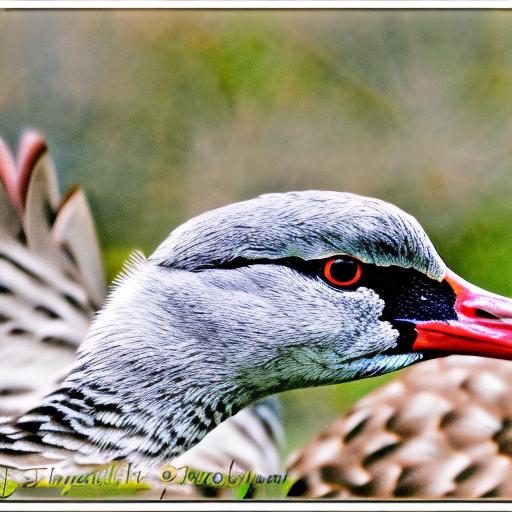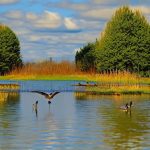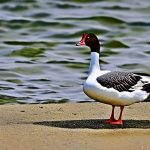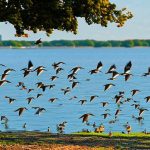Geese control on your lawn is an important topic to consider if you want to maintain a beautiful and healthy outdoor space. Geese are attracted to lawns for various reasons, and their presence can become a nuisance. Understanding geese behavior is crucial in finding effective strategies to keep them off your property. By implementing the right techniques, you can create a geese-free environment that is safe and enjoyable for everyone.
Key Takeaways
- Geese are social animals that mate for life and are highly protective of their young.
- Geese can cause damage to lawns, gardens, and property, and their droppings can pose health risks.
- Strategies for keeping geese off your lawn include physical barriers, habitat modification, and scare tactics.
- Deterrents such as noise makers, visual repellents, and taste aversions can be effective in keeping geese away.
- Natural repellents like grape extract and predator urine can be used to discourage geese from settling on your property.
Understanding the Geese Behavior
Geese are naturally drawn to lawns because they provide easy access to food and water sources. Lawns offer a lush and open space for geese to graze on grass, which is their primary food source. Additionally, lawns often have bodies of water nearby, such as ponds or lakes, where geese can swim and find shelter. These factors make lawns an ideal habitat for geese.
However, geese can quickly become a nuisance on your property. They are known for their aggressive behavior, especially during nesting season when they are protecting their eggs or young goslings. Geese can become territorial and may hiss, chase, or even attack humans or pets that come too close to their nesting area. Their droppings can also be a major issue, as they are unsightly and can damage your lawn.
The Importance of Keeping Geese off Your Lawn
Keeping geese off your lawn is essential for several reasons. Firstly, geese can cause significant damage to your property. Their constant grazing can lead to bare patches on your lawn, making it look unsightly and uneven. Additionally, their droppings contain high levels of nitrogen, which can burn the grass and leave brown patches behind.
Furthermore, geese droppings pose a health risk to humans and pets. They can contain harmful bacteria such as E. coli and Salmonella, which can cause illnesses if ingested or if they come into contact with open wounds. Geese droppings can also attract other pests, such as flies and rats, which can further damage your property and pose additional health risks.
The Risks Associated with Geese on Your Lawn
The health risks associated with geese droppings are a significant concern. When geese defecate on your lawn, the bacteria in their droppings can contaminate the soil and water sources. This contamination can lead to the spread of diseases and infections, especially if you have children or pets who play on the lawn.
In addition to health risks, geese can attract other pests to your property. Their droppings provide a food source for flies, which can quickly multiply and become a nuisance. Flies can carry diseases and spread them to humans and animals. Geese droppings can also attract rats, which can cause damage to your property and pose a threat to your health.
Strategies for Keeping Geese off Your Lawn
There are several strategies you can employ to keep geese away from your lawn. One effective method is to make your lawn less attractive to geese by reducing their food sources. This can be done by regularly mowing your lawn to keep the grass short, removing any fallen fruits or berries, and using bird feeders that are designed to deter geese.
Another strategy is to create physical barriers that prevent geese from accessing your lawn. This can be done by installing fences or hedges around the perimeter of your property or using netting or wire mesh to cover areas where geese tend to congregate. These barriers make it difficult for geese to land or walk on your lawn.
Using Deterrents to Keep Geese Away

Deterrents are another effective method for keeping geese away from your lawn. There are various types of deterrents available, including visual deterrents, auditory deterrents, and motion-activated deterrents. Visual deterrents, such as scarecrows or reflective tape, can create the illusion of a predator and scare geese away. Auditory deterrents, such as noise-making devices or ultrasonic devices, emit sounds that are unpleasant to geese and deter them from staying in the area. Motion-activated deterrents, such as sprinklers or lights, startle geese when they approach and encourage them to leave.
The Benefits of Natural Repellents for Geese Control
Using natural repellents for geese control has several benefits. Natural repellents are safe for the environment and do not harm geese or other wildlife. They are also non-toxic and pose no risk to humans or pets. Natural repellents work by emitting scents or tastes that are unpleasant to geese, causing them to avoid the treated area. Some common natural repellents include grape extract, peppermint oil, or garlic spray.
Natural repellents are also cost-effective and easy to apply. They can be purchased at garden centers or online, and most come in ready-to-use formulas. Applying natural repellents regularly can create a barrier that deters geese from landing on your lawn, keeping your property free from their presence.
Professional Geese Control Services: What You Need to Know
If you are facing a severe geese problem on your property, it may be beneficial to hire a professional geese control service. These services have the expertise and experience to effectively manage geese populations and implement long-term solutions. They can assess your property, identify the root causes of the geese problem, and develop a customized plan to keep geese away.
When choosing a professional geese control service, it is important to consider their reputation and track record. Look for companies that have experience in dealing with geese control and have positive reviews from previous clients. Additionally, ensure that the service provider uses humane and environmentally-friendly methods to manage geese populations.
The Long-Term Effects of Geese on Your Lawn
Ignoring the presence of geese on your lawn can have long-term effects on your property. Geese can cause significant damage to your lawn, resulting in bare patches and uneven growth. Over time, this can lead to the need for costly repairs or even the replacement of your entire lawn. Additionally, the health risks associated with geese droppings can persist if not addressed, potentially leading to illnesses and infections.
The Legalities of Geese Control on Your Property
It is important to be aware of the legalities surrounding geese control on your property. In many areas, geese are protected under wildlife conservation laws, and it is illegal to harm or kill them without proper permits. It is essential to check with local authorities or consult with a professional geese control service to ensure that you are in compliance with the law when implementing geese control measures.
Creating a Geese-Free Environment: Tips and Tricks
To create a geese-free environment, there are several tips and tricks you can follow. Firstly, make sure to remove any potential food sources for geese, such as fallen fruits or berries. Regularly clean up any spilled birdseed or pet food that may attract geese. Secondly, consider installing decoys or visual deterrents, such as scarecrows or reflective tape, to create the illusion of a predator and scare geese away. Lastly, if you have a pond or lake on your property, consider installing a fence or netting around it to prevent geese from accessing the water.
Geese control on your lawn is crucial for maintaining a beautiful and healthy outdoor space. Understanding geese behavior and implementing effective strategies can help keep geese away from your property. By using deterrents, natural repellents, or seeking professional geese control services, you can create a geese-free environment that is safe and enjoyable for everyone. Take action today to keep geese off your lawn and protect your property.
If you’re looking for effective ways to keep geese off your lawn, you might find this article on Poultry Wizard helpful. It provides valuable insights and tips on how to care for goslings, which can be useful in deterring geese from invading your property. Check out the article here to learn more about keeping geese away and maintaining a goose-free lawn.
FAQs
What are some effective ways to keep geese off my lawn?
There are several effective ways to keep geese off your lawn, including using decoys, installing fencing, using repellents, and modifying the landscape.
What are some natural repellents that can be used to keep geese away?
Some natural repellents that can be used to keep geese away include planting tall grasses, using predator urine, and using reflective tape or balloons.
What are some non-lethal methods to deter geese from my property?
Non-lethal methods to deter geese from your property include using noise makers, using motion-activated sprinklers, and using visual deterrents such as flags or balloons.
Is it legal to harm or kill geese to keep them off my property?
No, it is not legal to harm or kill geese to keep them off your property. Geese are protected under federal law, and harming or killing them can result in fines and other penalties.
What are some long-term solutions to keep geese off my lawn?
Some long-term solutions to keep geese off your lawn include modifying the landscape to make it less attractive to geese, using habitat modification techniques, and implementing a comprehensive goose management plan.
Meet Walter, the feathered-friend fanatic of Florida! Nestled in the sunshine state, Walter struts through life with his feathered companions, clucking his way to happiness. With a coop that’s fancier than a five-star hotel, he’s the Don Juan of the chicken world. When he’s not teaching his hens to do the cha-cha, you’ll find him in a heated debate with his prized rooster, Sir Clucks-a-Lot. Walter’s poultry passion is no yolk; he’s the sunny-side-up guy you never knew you needed in your flock of friends!







